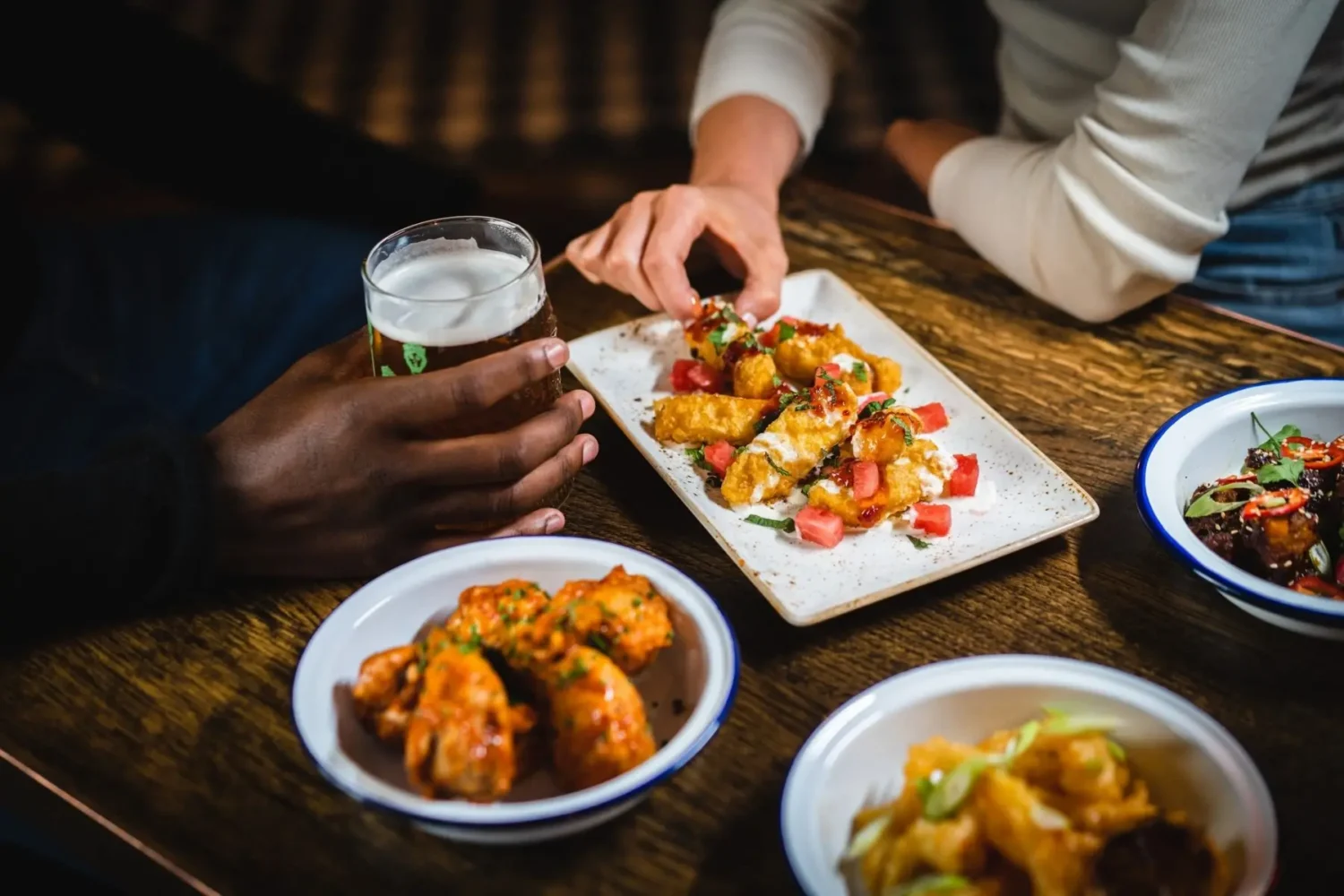
The United Kingdom, with its rich history and cultural diversity, offers a gastronomic journey that extends far beyond its traditional teas and hearty breakfasts. The local pub lies at the heart of British culinary culture, serving up dishes that are as comforting and satisfying as they are steeped in tradition. From savory pies to succulent roasts, pub food in the UK is a celebration of local produce, traditional cooking, and communal dining.
This blog explores the must-try dishes that define the quintessential British pub experience, inviting travelers and food enthusiasts to delve into the flavors that make the UK’s pub fare a beloved part of its cultural heritage. Pubs are also a great spot for breakfast and brunch around the UK and Ireland.
1. Fish and Chips: The Quintessential British Comfort Food
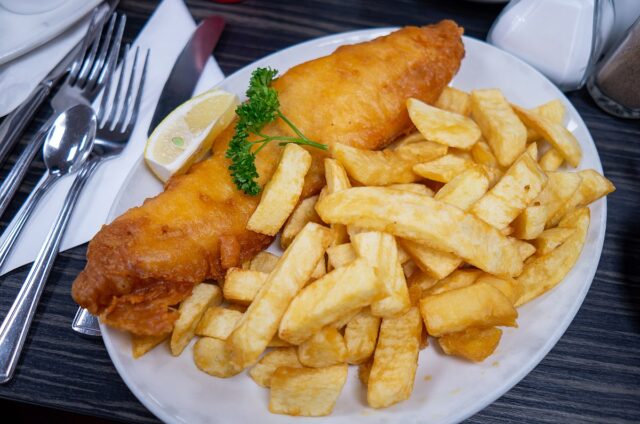
No culinary tour of UK pub food would be complete without the iconic fish and chips. This beloved dish, featuring battered and fried fish accompanied by thick-cut chips, has been a staple in British pubs for over a century.
- Historical Roots and Cultural Significance: Fish and chips gained popularity in the 19th century as a nourishing, affordable meal for the working class. Its simplicity, accessibility, and delicious taste have cemented its status as a national dish, symbolizing comfort and culinary delight in British culture.
- The Perfect Serve: The best fish and chips are about freshness and quality. Cod or haddock is commonly used, coated in a light, crispy batter, and fried to golden perfection. Served with chunky chips, mushy peas, tartar sauce, and a wedge of lemon, it’s a hearty meal that harmoniously blends flavors and textures. Pubs across the UK take pride in their version of this classic, often adding their own twist to the traditional recipe.
2. Sunday Roast: A Celebratory Feast
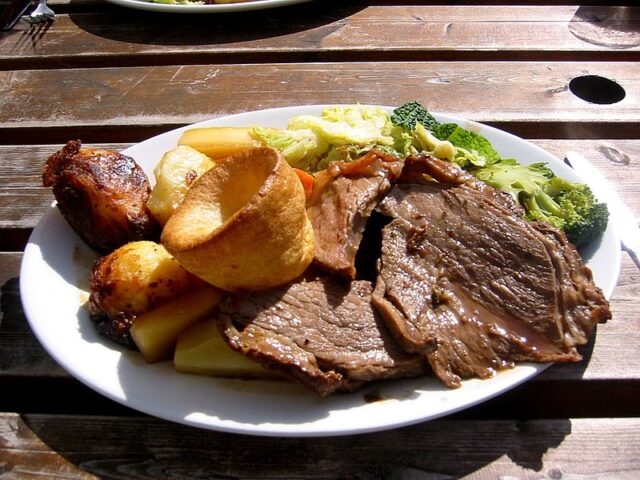
The Sunday roast is a time-honored tradition in the UK, bringing families and friends together in pubs across the country to enjoy a leisurely afternoon meal. It’s a testament to the British love for roasted meats, seasonal vegetables, and the joy of sharing a meal.
- Components of the Classic Roast: A typical Sunday roast includes succulent slices of roasted beef, lamb, pork, or chicken, served alongside roasted potatoes, Yorkshire pudding, stuffing, and an assortment of seasonal vegetables. The dish is generously drizzled with rich gravy, made from the meat’s juices, to tie all the elements together.
- Cultural and Social Essence: Beyond its delicious taste, the Sunday roast embodies the spirit of British hospitality and community. It’s an occasion for relaxation and conviviality, where the slow-paced enjoyment of food and conversation takes center stage. Pubs across the UK uphold this tradition, offering a warm, inviting atmosphere where patrons can indulge in this sumptuous feast.
3. Ploughman’s Lunch: A Rustic Delight
The Ploughman’s lunch is a cold, hearty platter that showcases the simplicity and richness of British farmhouse fare. This dish, typically enjoyed during lunch, offers a taste of the British countryside with its fresh, locally sourced ingredients.
- Anatomy of a Ploughman’s Lunch: At its core, the Ploughman’s lunch features thick slices of crusty bread, a selection of British cheeses (such as Cheddar, Stilton, or Red Leicester), and pickles or chutney. The platter may also include slices of ham or other cold cuts, boiled eggs, apple slices, and a small salad, creating a balanced, flavorful meal.
- Symbol of British Rural Life: The Ploughman’s lunch has agricultural roots, reputedly named after the meals that farmers would enjoy in the fields. Today, it remains a popular choice in pubs for its freshness, simplicity, and connection to the pastoral landscapes of the UK. It’s a meal that invites diners to savor each component and appreciate the quality of local produce.
These three dishes – fish and chips, the Sunday roast, and the Ploughman’s lunch – are pillars of the UK’s pub cuisine, each offering a window into the country’s culinary traditions and cultural ethos. Whether it’s the comforting crunch of fish and chips, the familial warmth of a Sunday roast, or the rustic charm of a Ploughman’s lunch, these meals are more than just food; they are a celebration of British heritage, communal dining, and the timeless pleasure of a good meal shared with good company.
4. Steak and Ale Pie: A Hearty British Classic
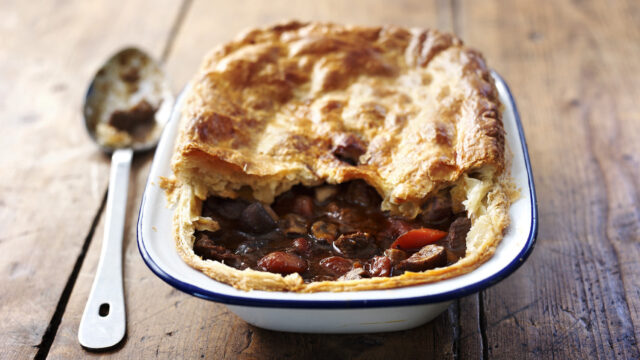
Steak and ale pie is a staple of British pub cuisine, combining tender, slow-cooked meat with rich, flavorful ale-infused gravy, all encased in a flaky, buttery pastry. This dish is a testament to the UK’s love for hearty, comforting meals that warm the soul.
- Culinary Craftsmanship: The making of a steak and ale pie is an art that balances flavors and textures. The steak, often chuck or brisket, is slow-cooked until tender, mingled with onions, carrots, and herbs, and then enriched with a robust ale, typically a dark stout or bitter. This mixture is then enveloped in shortcrust or puff pastry, baked until the crust rises and turns golden brown, creating a delightful contrast between the crisp exterior and the savory, moist filling.
- A Symbol of Homeliness and Tradition: The steak and ale pie’s enduring popularity in pubs across the UK is a nod to its status as comfort food par excellence. It’s often served with mashed potatoes, peas, and extra gravy on the side, offering a fulfilling experience that speaks to the heart of traditional British cooking.
5. Bangers and Mash: The Quintessential Pub Grub
Bangers and mash, consisting of sausages and mashed potatoes, served with onion gravy, is a beloved pub classic in the UK. Its simplicity, satisfying taste, and filling nature make it a favorite among patrons seeking a taste of home-cooked comfort.
- The Essence of Bangers and Mash: The term “bangers” originated during World War I, referring to sausages that would make a banging sound when fried, due to the high water content used during meat shortages. Today, the sausages are typically made of pork or beef and are seasoned with herbs and spices, providing a flavorful complement to the creamy, buttery mashed potatoes.
- Comfort Food at Its Best: Bangers and mash is more than just a meal; it’s a comfort food that evokes a sense of nostalgia and warmth. The rich onion gravy, often made with meat drippings, onions, and stock, adds depth and richness to the dish, creating a hearty meal that satisfies the soul.
6. Scotch Eggs: A Savory Snack with a Crunch
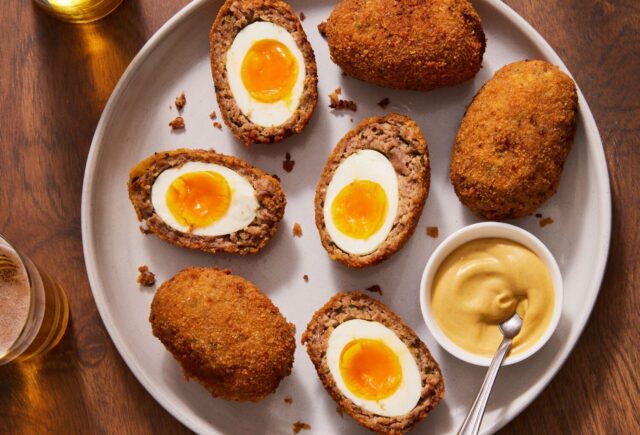
Originating in the UK, Scotch eggs consist of a hard or soft-boiled egg wrapped in sausage meat, coated in breadcrumbs, and deep-fried to golden perfection. This snack has become a pub favorite, known for its satisfying texture and flavorful profile.
- A Delightful Combination: The Scotch egg is a perfect example of British culinary ingenuity, offering a delightful combination of textures and flavors. The crispy breadcrumb coating gives way to savory sausage meat, with the egg in the center providing a smooth contrast. It’s often served with pickles or chutney, adding an extra tangy kick.
- From Picnic Fare to Pub Favorite: While Scotch eggs were initially created as a portable snack for picnics and journeys, they have found a beloved place in the pub food scene. Their popularity has grown due to their convenience, taste, and the satisfying experience they offer, making them a staple in British pubs.
These additional dishes, from the comforting steak and ale pie to the simple yet satisfying bangers and mash, and the uniquely delightful Scotch eggs, further illustrate the richness and diversity of British pub cuisine. Each dish offers a window into the UK’s culinary traditions, showcasing how simple ingredients can be transformed into memorable meals that capture the essence of British culture and hospitality.














